-
Greenhouse gas concentrations in the atmosphere reach new record
The amount of greenhouse gases in the atmosphere reached a new record high in 2011, according to the World Meteorological Organization (WMO); between 1990 and 2011 there was a 30 percent increase in radiative forcing — the warming effect on our climate — because of carbon dioxide (CO2) and other heat-trapping long-lived gases; a new WMO Greenhouse Gas Bulletin highlights pivotal role of carbon sinks
-
-
Learning the lessons of the BP oil spill
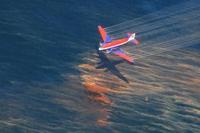
In an attempt to limit the harm of the Deepwater Horizon oil spill in the Gulf of Mexico in 2010, three million liters of dispersant were used to dissipate the oil; on the surface the damage seems limited, but the seabed is covered with a thick layer of gunk; scientist from around the world are now working on models that can be consulted by decision makers when there is another oil spill disaster
-
-
The challenge of securing food and water supplies in the twenty-first century
Participants in the Food Security in Dry Lands (FSDL) conference, held last week in Qatar, agreed that the task of managing food and water resources more efficiently and improving the security of supply are set to become one of the biggest challenges for policy makers in the twenty-first century
-
-
Combining CO2 storage with enhanced oil recovery can aid U.K. economy
Combining carbon storage with enhanced oil recovery techniques in key fields could generate up to 2.7 billion pounds in extra economic output; if a combination of carbon storage and enhanced recovery techniques is fully exploited, it is estimated that nineteen potentially suitable oil fields on the U.K. Continental Shelf (UKCS) could contribute 15 percent of all UKCS oil production by 2030
-
-
“Soft infrastructure” as storm surge defense alternatives
The flooding in New York and New Jersey caused by Superstorm Sandy prompted calls from Governor Andrew Cuomo and other officials to consider building storm surge barriers to protect Lower Manhattan from future catastrophes. Such a strategy, however, could make things even worse for outlying areas that were hit hard by the hurricane, such as Staten Island, the New Jersey Shore, and Long Island’s South Shore, a City College of New York landscape architecture professor warns; landscapers and engineers say that environmentally friendly “soft infrastructure” would mitigate flood damage without sending harm elsewhere
-
-
Chemists convert greenhouse gas to fuel
What if you could take greenhouse gas and convert it to fuel for an energy-hungry world? Scientists, using modern genetics, accomplished exactly this; the researchers’ findings are just a first step toward converting carbon dioxide, one of the most abundant emissions from fossil fuel use, into usable hydrocarbons
-
-
The world’s 300 000 glaciers are melting, causing sea level to rise
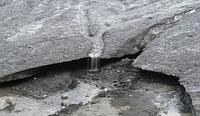
Anthropogenic climate change leads to melting glaciers and rising sea level; between 1902 and 2009, melting glaciers contributed eleven centimeters to sea level rise; they were therefore the most important cause of sea level rise; the scientists numerically modeled the changes of each of the world’s 300 000 glaciers
-
-
How groundwater pumping affects streamflow
Groundwater provides drinking water for millions of Americans and is the primary source of water to irrigate cropland in many of the nations most productive agricultural settings; although the benefits of groundwater development are many, groundwater pumping can reduce the flow of water in connected streams and rivers — a process called streamflow depletion by wells; new USGS report describes processes and misconceptions concerning the effects of groundwater pumping on streamflow
-
-
Sequestration will have a devastating impact on U.S. research enterprise
Three organizations representing more than 200 of the U.S. leading academic research institutions yesterday launched a Web site that aims to inform policymakers and the public of the impact that the upcoming budget sequester would have on federal funding for university research; the Web site highlights the importance of federally funded university research to innovation, economy, an society
-
-
DARPA seeking surveillance technology to predict future behavior
DARPA has teamed up with scientists from Carnegie Mellon University to create an artificial intelligence system that can watch and predict what a person will “likely” do in the future, using specially programmed software designed to analyze various real-time video surveillance feeds; the system can automatically identify and notify officials if it recognized that an action is not permitted, detecting what is described as anomalous behaviors
-
-
Snowpack, essential freshwater source for billions, threatened
Snowpack, an essential source of drinking water and agricultural irrigation for billions of people, could shrink significantly within the next thirty years; the news is particularly troubling for snowpack-dependent California — the largest producer of agriculture products in the country and the sixth-largest agriculture exporter in the world; by filling reservoirs and watering crops when warmer, drier weather sets in, mountain snowpack has become vital to people and ecosystems in regions such as the Western United States, Alpine Europe, Central Asia, and downstream of the Himalayas and Tibetan Plateau — home to more than 50 percent of the world’s population
-
-
Himalayan glaciers to shrink even if temperatures hold steady, risking South Asia water supply
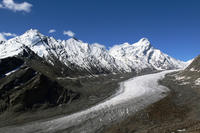
Come rain or shine, or even snow, some glaciers of the Himalayas will continue shrinking for many years to come; the most conservative findings of a new research on Bhutan, a region in the bull’s-eye of the monsoonal Himalayas, indicate that even if climate remained steady, almost 10 percent of Bhutan’s glaciers would vanish within the next few decades; what is more, the amount of melt water coming off these glaciers could drop by 30 percent
-
-
Exemplary engineering programs at U.S. colleges and universities
Dr. Charles M. Vest, president of the National Academy of Engineering, says that “This nation’s prosperity, security, and quality of life are direct results of leadership in the engineering achievements that drive society forward”; the National Academy of Engineering (NAE) has released Infusing Real World Experiences into Engineering Education, which showcases twenty-nine engineering programs at colleges and universities across the United States which effectively incorporate such activities into their curriculum; the report also highlights best practices for schools seeking to create new programs
-
-
Hurricane Sandy caused dramatic changes to hundreds of miles of East Coast shoreline
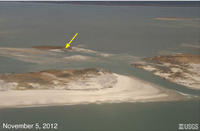
The United States Geological Survey (USGS) has released a series of aerial photographs showing before-and-after images of Hurricane Sandy’s impacts on the Atlantic Coast; the photos, part of a USGS assessment of coastal change from as far south as the Outer Banks of North Carolina to as far north as Massachusetts, show that the storm caused dramatic changes to portions of shoreline extending hundreds of miles
-
-
Why typhoid fever pathogen targets only humans
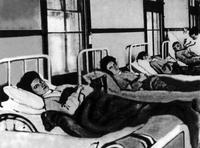
Salmonella typhiis a particularly nasty bacterium that targets only humans and causes typhoid fever, which kills hundreds of thousands of people annually; scientists explain how evolution shaped the pathogen to be so selective
-
More headlines
The long view
New Technology is Keeping the Skies Safe
DHS S&T Baggage, Cargo, and People Screening (BCP) Program develops state-of-the-art screening solutions to help secure airspace, communities, and borders
Factories First: Winning the Drone War Before It Starts
Wars are won by factories before they are won on the battlefield,Martin C. Feldmann writes, noting that the United States lacks the manufacturing depth for the coming drone age. Rectifying this situation “will take far more than procurement tweaks,” Feldmann writes. “It demands a national-level, wartime-scale industrial mobilization.”
How Artificial General Intelligence Could Affect the Rise and Fall of Nations
Visions for potential AGI futures: A new report from RAND aims to stimulate thinking among policymakers about possible impacts of the development of artificial general intelligence (AGI) on geopolitics and the world order.
Smaller Nuclear Reactors Spark Renewed Interest in a Once-Shunned Energy Source
In the past two years, half the states have taken action to promote nuclear power, from creating nuclear task forces to integrating nuclear into long-term energy plans.
Keeping the Lights on with Nuclear Waste: Radiochemistry Transforms Nuclear Waste into Strategic Materials
How UNLV radiochemistry is pioneering the future of energy in the Southwest by salvaging strategic materials from nuclear dumps –and making it safe.
Model Predicts Long-Term Effects of Nuclear Waste on Underground Disposal Systems
The simulations matched results from an underground lab experiment in Switzerland, suggesting modeling could be used to validate the safety of nuclear disposal sites.
